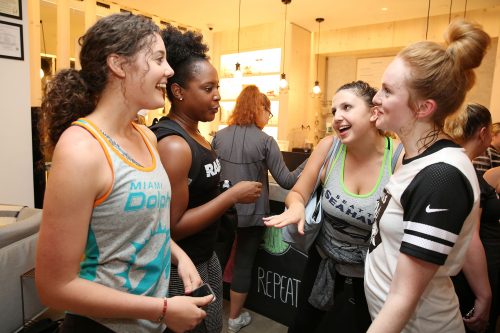A new television series called “Pitch,” premiered this past week, which centers around the first woman ever to play in Major League Baseball. In their preview for the show, the New York Times wrote “And how will it cater to the hard-core baseball fan expecting authenticity while still appealing to women, whom Fox is depending on for much of its viewership?”
Assuming those two groups are mutually exclusive.
There’s an attitude that is prevalent in sports media and from teams that women are not on the same level as men when it comes to fandom. The New York Times article shows an attitude that women need something other than the actual sports, such as drama, to bring them into the game.
It’s an attitude that extends to teams, when they condescendingly try to appeal to women by assuming they don’t know sports. The NBA’s Dallas Mavericks announced a “Ladies Night” for this upcoming season, which featured an “NBA 101 for women” program. Their marketing program said “NBA 101 for women is an annual event hosted by Mavs players, coaches and staff. It’s an opportunity for women to learn and understand the fundamentals of basketball in a fun, light and interactive atmosphere.”
Assuming women need to be taught about sports like they’re children.
A Gallup poll in 2015 said that 51 percent of women identified as sports fans. While not as large as men, who clocked in at 66 percent, that’s still

the majority of women who said they enjoy sports. So why are women continued to be treated like they aren’t “real” sports fans?
It’s shown in the way clothing is marketed towards women sports fans. The primary advertising for clothing for many different teams features tight-fitting or pink apparel, leaving an impression of overly-feminized clothing as the first option for women.
Samantha Rivera, a sports staff writer for the DePaulia, said that she is treated differently both as a reporter and as a fan because she’s a woman.
“I definitely get garbage from other random fans when I talk about sports. They seem to think that because I’m a girl, I can’t possibly know who Jimmy Garoppolo or Carson Wentz are, or that the Bears’ defense is at its lowest I’ve seen it in awhile,” she said. “No, it’s just not possible that a person with longer hair than me could have that kind of knowledge.”
Women sports reporters are also treated far more harshly than their male counterparts. There was a video earlier this year that showed men reading tweets that two reporters, 670 the Score’s Julie DiCaro and ESPN’s Sarah Spain, received. These included gender-specific insults such as “Hopefully this skank Julie DiCaro is Bill Cosby’s next victim. That would be classic,” and “I hope your boyfriend beats you.”
These all come from an attitude that says “women don’t belong in sports.” It comes from a sports culture where the worst insult a young boy can receive is “you play ball like a girl.” It’s certainly something I heard growing up from football coaches, and it’s certainly something that stung when I heard it. It made me feel weak and like I wasn’t bringing the masculinity necessary for the sport.
There needs to be a change in the way sports treat women. Like the Gallup poll said, the majority of women are sports fans. A 2011 survey, the most recent data on the subject, showed that 3.2 million girls played sports in high school and 200,000 play collegiately. Women belong in sports, but they need to be treated like people. Not this condescending, old boy’s club attitude that many women receive currently.
It’s only 51 percent of women who identified as sports fans, so there is room for growth. Outreach to reach potential women sports fans is not a bad thing, and should be encouraged. But the outreach needs to come from a place of growing the sport and reaching out to women like equals, not a niche market that will only get into sports with pink jerseys.



